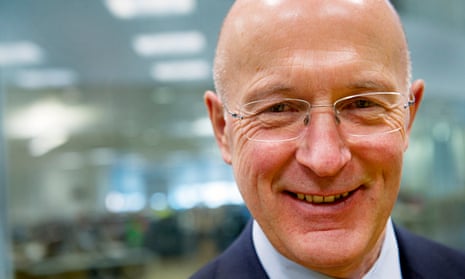Sir Philip Hampton, chairman of Royal Bank of Scotland, is to quit his role at the helm of the bailed-out bank to take the same position at the embattled pharmaceutical company GlaxoSmithKline.
In coordinated announcements from the companies expected before the weekend, Hampton is to be named as successor to Sir Christopher Gent at GSK. Gent has said he intends to retire from the pharmaceutical company at the end of 2015.
RBS, which is 81% owned by the taxpayer, is now likely to hasten the search for a successor to Hampton, who was parachuted into the Edinburgh-based bank at the height of the banking crisis in 2009 and whose departure has been the subject of speculation for some time.
Hampton is not expected to leave RBS immediately. He will remain on the board until after the general election in May to ensure a smooth handover when a new government is elected.
Negotiating with politicians is regarded as a key skill for any chairman of RBS because of the stake owned by the Treasury, even though it is held through UK Financial Investments, a body that has a mandate to look after the shareholding at arm’s length from the government.
Hampton’s future has been the subject of debate since Stephen Hester was forced out as chief executive of RBS last year. RBS’s senior independent director Sir Sandy Crombie, the former boss of Standard Life, has been leading the search.
Hampton – who has had a career spanning investment banking, and boardroom positions as a finance director and as chairman of supermarket chain Sainsbury’s – had promised to stay until Ross McEwan, who replaced Hester last October, had settled in.
RBS refused to comment. A GSK spokesman said: “Succession planning for the chairman is well under way.”
Hampton, 62, is expected to join the board of GSK next year and play a key role in helping rebuild its reputation, which has been battered by a bribery sandal. Last week GSK was fined £300m by Chinese authorities. The former boss of its Chinese operations – Mark Reilly – is being deported back to the UK. Reilly pleaded guilty to bribery-related charges and was given a three-year jail term, suspended for four years, after being accused of overseeing a “criminal godfather” scheme to bribe doctors.
It sparked an apology by GSK and a pledge to learn from its mistakes. A sex film of Reilly and his Chinese girlfriend was sent to GSK board members – including the chief executive Andrew Witty – which blew open the scandal.
The pharmaceutical company is also under investigation by the Serious Fraud Office and the US department of justice over allegations of bribery around the world, including in Poland and Lebanon.
Hampton is used to issuing apologies after scandals, including RBS’s £390m fine for Libor rigging, in 2013, which he described as a sad day.
RBS also facing further controversy, warning in its half-year results in August that the cost of fines or settlements from the investigation into currency market rigging could be “material”, that is knocking its profits.
The bank is also continuing with an overhaul of its business after the 2008 bailout, which on Wednesday led to the partial flotation of its US arm, Citizens Financial, on the New York stock exchange. RBS shares rose 1% to 362p after the deal, although they remain well below the 500p at which the taxpayer breaks even on its £45bn (£28bn) stake in the bank.
RBS did not raise as much as it had hoped from the flotation of the 25% stake, cutting the share price to below the indicated range of between $23 and $25 a share, which would have valued the entire US arm at $14bn. Instead the shares were priced at $21.5 a share. The rest of the stake is to be sold off by the end of 2016 to meet EU rules.
In early trading in New York, the shares remained just above the price at which they were sold to investors in what was the biggest flotation of a bank in the US in recent years. McEwan said the sale was “a key step on the path to full divestment” and would improve RBS’s financial strength.
